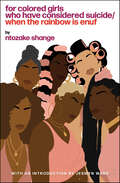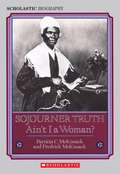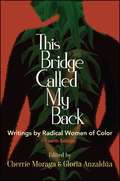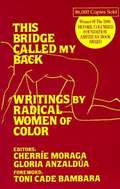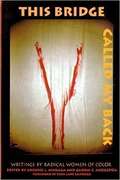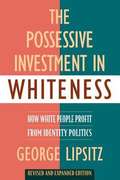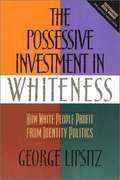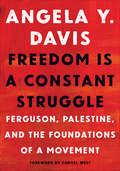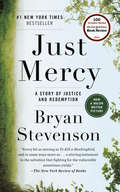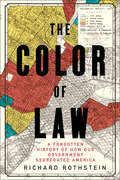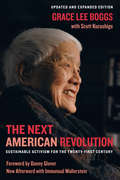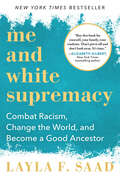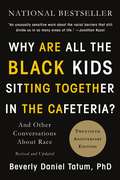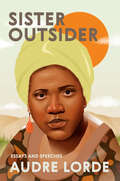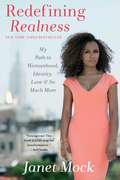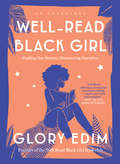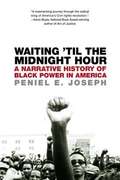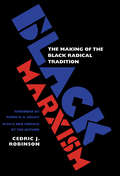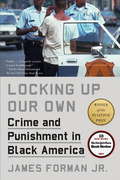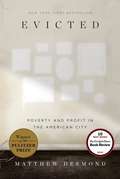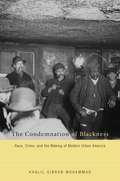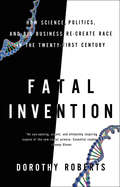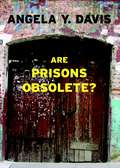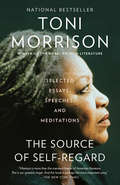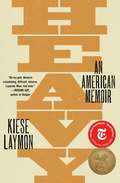Special Collections
Anti-Racism 101
- Table View
- List View
For colored girls who have considered suicide/When the rainbow is enuf
by Ntozake ShangeNtozake Shange&’s classic, award-winning play encompassing the wide-ranging experiences of Black women, now with introductions by two-time National Book Award winner Jesmyn Ward and Broadway director Camille A. Brown.From its inception in California in 1974 to its Broadway revival in 2022, the Obie Award–winning for colored girls who have considered suicide/when the rainbow is enuf has excited, inspired, and transformed audiences all over the country for nearly fifty years. Passionate and fearless, Shange&’s words reveal what it meant to be a woman of color in the 20th century.First published in 1975, when it was praised by The New Yorker for &“encompassing…every feeling and experience a woman has ever had,&” for colored girls who have considered suicide/when the rainbow is enuf will be read and performed for generations to come. Now with new introductions by Jesmyn Ward and Broadway director Camille A. Brown, and one poem not included in the original, here is the complete text of a groundbreaking dramatic prose poem that resonates with unusual beauty in its fierce message to the world.
Sojourner Truth
by Patricia C. Mckissack and Fredrick MckissackThis 1993 Coretta Scott King Honor Book chronicles the life of African-American Sojourner Truth, a nineteenth-century preacher, abolitionist, and activist for the rights of African Americans and women.
This Bridge Called My Back
by Gloria Anzaldúa and Cherríe MoragaOriginally released in 1981, This Bridge Called My Back is a testimony to women of color feminism as it emerged in the last quarter of the twentieth century. Through personal essays, criticism, interviews, testimonials, poetry, and visual art, the collection explores, as coeditor Cherríe Moraga writes, “the complex confluence of identities—race, class, gender, and sexuality—systemic to women of color oppression and liberation.”
Reissued here, nearly thirty-five years after its inception, the fourth edition contains an extensive new introduction by Moraga, along with a previously unpublished statement by Gloria Anzaldúa. The new edition also includes visual artists whose work was produced during the same period as Bridge, including Betye Saar, Ana Mendieta, and Yolanda López, as well as current contributor biographies. Bridge continues to reflect an evolving definition of feminism, one that can effectively adapt to, and help inform an understanding of the changing economic and social conditions of women of color in the United States and throughout the world.
This Bridge Called My Back
by Cherríe Moraga and Gloria Anzaldúa and Toni Cade BambaraThis Bridge Called My Back intends to reflect an uncompromised definition of feminism by women of color in the United States. Containing prose, poetry, personal narrative and analysis by Afro-American, Asian American, Latina, and Native American women, This Bridge Called My Back is divided into six powerful sections. * Children passing in the streets The Roots of Our Radicalism * Entering the lives of others Theory in the Flesh * And when you leave, take your pictures with you Racism in the Women's Movement * Between the lines On Culture, Class and Homophobia * Speaking in tongues The Third World Woman Writer * El Mundo Zurdo The Vision
This Bridge Called My Back
by Cherrie Moraga and Gloria AnzaldúaWritings by radical women of color.
The Possessive Investment in Whiteness
by George LipsitzIn this unflinching look at white supremacy, George Lipsitz argues that racism is a matter of interests as well as attitudes, a problem of property as well as pigment. Above and beyond personal prejudice, whiteness is a structured advantage that produces unfair gains and unearned rewards for whites while imposing impediments to asset accumulation, employment, housing, and health care for minorities. Reaching beyond the black/white binary, Lipsitz shows how whiteness works in respect to Asian Americans, Latinos, and Native Americans. Lipsitz delineates the weaknesses embedded in civil rights laws, the racial dimensions of economic restructuring and deindustrialization, and the effects of environmental racism, job discrimination and school segregation. He also analyzes the centrality of whiteness to U. S. culture, and perhaps most importantly, he identifies the sustained and perceptive critique of white privilege embedded in the radical black tradition. This revised and expanded edition also includes an essay about the impact of Hurricane Katrina on working class Blacks in New Orleans, whose perpetual struggle for dignity and self determination has been obscured by the city's image as a tourist party town.
The Possessive Investment in Whiteness
by George LipsitzHard-hitting expose of American systemic societal racism.
Freedom Is a Constant Struggle
by Cornel West and Angela Davis and Frank Barat"Davis's arguments for justice are formidable. . . . The power of her historical insights and the sweetness of her dream cannot be denied."-The New York TimesIn these newly collected essays, interviews, and speeches, world-renowned activist and scholar Angela Y. Davis illuminates the connections between struggles against state violence and oppression throughout history and around the world.Reflecting on the importance of black feminism, intersectionality, and prison abolitionism for today's struggles, Davis discusses the legacies of previous liberation struggles, from the Black Freedom Movement to the South African anti-Apartheid movement. She highlights connections and analyzes today's struggles against state terror, from Ferguson to Palestine.Facing a world of outrageous injustice, Davis challenges us to imagine and build the movement for human liberation. And in doing so, she reminds us that "Freedom is a constant struggle."utspoken advocate for the oppressed and exploited, writing on Black liberation, women's liberation, prison abolition, and international solidarity with Palestine. She is the author of several books, including Women, Race, and Class and Are Prisons Obsolete? She is the subject of the acclaimed documentary Free Angela and All Political Prisoners and is professor emerita at the University of California, Santa Cruz.
Just Mercy
by Bryan StevensonA powerful true story about the potential for mercy to redeem us, and a clarion call to fix our broken system of justice—from one of the most brilliant and influential lawyers of our time
Bryan Stevenson was a young lawyer when he founded the Equal Justice Initiative, a legal practice dedicated to defending those most desperate and in need: the poor, the wrongly condemned, and women and children trapped in the farthest reaches of our criminal justice system. One of his first cases was that of Walter McMillian, a young man who was sentenced to die for a notorious murder he insisted he didn’t commit. The case drew Bryan into a tangle of conspiracy, political machination, and legal brinksmanship—and transformed his understanding of mercy and justice forever.
Just Mercy is at once an unforgettable account of an idealistic, gifted young lawyer’s coming of age, a moving window into the lives of those he has defended, and an inspiring argument for compassion in the pursuit of true justice.
A New York Times Bestseller
The Color of Law
by Richard RothsteinWidely heralded as a “masterful” (Washington Post) and “essential” (Slate) history of the modern American metropolis, Richard Rothstein’s The Color of Law offers “the most forceful argument ever published on how federal, state, and local governments gave rise to and reinforced neighborhood segregation” (William Julius Wilson).
Exploding the myth of de facto segregation arising from private prejudice or the unintended consequences of economic forces, Rothstein describes how the American government systematically imposed residential segregation: with undisguised racial zoning; public housing that purposefully segregated previously mixed communities; subsidies for builders to create whites-only suburbs; tax exemptions for institutions that enforced segregation; and support for violent resistance to African Americans in white neighborhoods.
A groundbreaking, “virtually indispensable” study that has already transformed our understanding of twentieth-century urban history (Chicago Daily Observer), The Color of Law forces us to face the obligation to remedy our unconstitutional past.
A New York Times Bestseller
The Next American Revolution
by Danny Glover and Scott Kurashige and Grace Lee BoggsA world dominated by America and driven by cheap oil, easy credit, and conspicuous consumption is unraveling before our eyes. In this powerful, deeply humanistic book, Grace Lee Boggs, a legendary figure in the struggle for justice in America, shrewdly assesses the current crisis--political, economical, and environmental--and shows how to create the radical social change we need to confront new realities. A vibrant, inspirational force, Boggs has participated in all of the twentieth century's major social movements--for civil rights, women's rights, workers' rights, and more. She draws from seven decades of activist experience, and a rigorous commitment to critical thinking, to redefine "revolution" for our times. From her home in Detroit, she reveals how hope and creativity are overcoming despair and decay within the most devastated urban communities. Her book is a manifesto for creating alternative modes of work, politics, and human interaction that will collectively constitute the next American Revolution.
Me and White Supremacy
by Layla SaadBased on the viral Instagram challenge that captivated participants worldwide, Me and White Supremacy takes readers on a 28-day journey of how to dismantle the privilege within themselves so that they can stop (often unconsciously) inflicting damage on people of color, and in turn, help other white people do better, too.
When Layla Saad began an Instagram challenge called #meandwhitesupremacy, she never predicted it would spread as widely as it did. She encouraged people to own up and share their racist behaviors, big and small. She was looking for truth, and she got it. Thousands of people participated in the challenge, and nearly 100,000 people downloaded the Me and White Supremacy Workbook.
Updated and expanded from the original workbook, Me and White Supremacy,takes the work deeper by adding more historical and cultural contexts, sharing moving stories and anecdotes, and including expanded definitions, examples, and further resources.Awareness leads to action, and action leads to change. The numbers show that readers are ready to do this work—let's give it to them.
A New York Times Bestseller
Why Are All the Black Kids Sitting Together in the Cafeteria?
by Beverly TatumWalk into any racially mixed high school and you will see black youth seated together in the cafeteria. Of course, it's not just the black kids sitting together-the white, Latino, Asian Pacific, and, in some regions, American Indian youth are clustered in their own groups, too.
The same phenomenon can be observed in college dining halls, faculty lounges, and corporate cafeterias. What is going on here? Is this self-segregation a problem we should try to fix, or a coping strategy we should support? How can we get past our reluctance to talk about racial issues to even discuss it? And what about all the other questions we and our children have about race?
Beverly Daniel Tatum, a renowned authority on the psychology of racism, asserts that we do not know how to talk about our racial differences: Whites are afraid of using the wrong words and being perceived as "racist" while parents of color are afraid of exposing their children to painful racial realities too soon.
Using real-life examples and the latest research, Tatum presents strong evidence that straight talk about our racial identities-whatever they may be-is essential if we are serious about facilitating communication across racial and ethnic divides. We have waited far too long to begin our conversations about race. This remarkable book, infused with great wisdom and humanity, has already helped hundreds of thousands of readers figure out where to start.
A New York Times Bestseller
Sister Outsider
by Audre Lorde and Cheryl ClarkePresenting the essential writings of black lesbian poet and feminist writer Audre Lorde, SISTER OUTSIDER celebrates an influential voice in twentieth-century literature. In this charged collection of fifteen essays and speeches, Lorde takes on sexism, racism, ageism, homophobia, and class, and propounds social difference as a vehicle for action and change. Her prose is incisive, unflinching, and lyrical, reflecting struggle but ultimately offering messages of hope. This commemorative edition includes a new foreword by Lorde scholar and poet Cheryl Clarke, who celebrates the ways in which Lorde's philosophies resonate more than twenty years after they were first published. These landmark writings are, in Lorde's own words, a call to "never close our eyes to the terror, to the chaos which is Black which is creative which is female which is dark which is rejected which is messy which is. ..."
Reviews: "...it's been almost a quarter of a century since Audre Lorde's essays and speeches in Sister Outsider made an indelible mark on 20th-century literature. But the words of the black lesbian feminist poet seem as lyrical and unforgettable, and, sadly, as relevant today as when she first tackled everything from racism and homophobia to ageism and class dichotomies. A must-have book that every lesbian should read."--Curve Editor's Pick. "Lorde was a brilliant feminist poet and intellectual whose theories on the power of embracing our internal contradictions as well as the differences between people and groups is the way to powerful coalition building and social progress." --New York Post, Sunday. "Poet and librarian Lorde collected 15 of her finest essays and speeches in this 1984 volume. With her poet's command of language, she addresses sexism, racism, black women, black lesbians, eroticism, and more. Still powerful."--Library Journal, Starred Review. "Audre Lorde is a passionate sage. I say 'is' and not 'was' because her keen insights continue to provoke and sustain us and give us courage. The reissue of this book is a gift to longtime admirers and to new readers who have yet to discover the power and grace and splendid audacity of Audre Lorde."--Valerie Miner, author of After Eden and professor of feminist studies at Stanford University. "[Lorde's] works will be important to those truly interested in growing up sensitive, intelligent, and aware."--New York Times.
Redefining Realness
by Janet MockIn 2011, Marie Claire magazine published a profile of Janet Mock in which she stepped forward for the first time as a trans woman. Those twenty-three hundred words were life-altering for the People.com editor, turning her into an influential and outspoken public figure and a desperately needed voice for an often voiceless community. In these pages, she offers a bold and inspiring perspective on being young, multicultural, economically challenged, and transgender in America. Welcomed into the world as her parents' firstborn son, Mock decided early on that she would be her own person--no matter what. She struggled as the smart, determined child in a deeply loving yet ill-equipped family that lacked the money, education, and resources necessary to help her thrive. Mock navigated her way through her teen years without parental guidance, but luckily, with the support of a few close friends and mentors, she emerged much stronger, ready to take on--and maybe even change--the world.
This powerful memoir follows Mock's quest for identity, from an early, unwavering conviction about her gender to a turbulent adolescence in Honolulu that saw her transitioning during the tender years of high school, self-medicating with hormones at fifteen, and flying across the world alone for sex reassignment surgery at just eighteen. With unflinching honesty, Mock uses her own experience to impart vital insight about the unique challenges and vulnerabilities of trans youth and brave girls like herself. Despite the hurdles, Mock received a scholarship to college and moved to New York City, where she earned a master's degree, enjoyed the success of an enviable career, and told no one about her past. She remained deeply guarded until she fell for a man who called her the woman of his dreams. Love fortified her with the strength to finally tell her story, enabling her to embody the undeniable power of testimony and become a fierce advocate for a marginalized and misunderstood community. A profound statement of affirmation from a courageous woman, Redefining Realness provides a whole new outlook on what it means to be a woman today, and shows as never before how to be authentic, unapologetic, and wholly yourself.
Well-Read Black Girl
by Glory EdimAn inspiring collection of essays by black women writers, curated by the founder of the popular book club Well-Read Black Girl, on the importance of recognizing ourselves in literature. “Yes, Well-Read Black Girl is as good as it sounds. . . . [Glory Edim] gathers an all-star cast of contributors—among them Lynn Nottage, Jesmyn Ward, and Gabourey Sidibe.”—O: The Oprah Magazine (“10 Books to be Thankful for This November”) Remember that moment when you first encountered a character who seemed to be written just for you? That feeling of belonging remains with readers the rest of their lives—but not everyone regularly sees themselves in the pages of a book. In this timely anthology, Glory Edim brings together original essays by some of our best black women writers to shine a light on how important it is that we all—regardless of gender, race, religion, or ability—have the opportunity to find ourselves in literature. Contributors include Jesmyn Ward (Sing, Unburied, Sing), Lynn Nottage (Sweat), Jacqueline Woodson (Another Brooklyn), Gabourey Sidibe (This Is Just My Face), Morgan Jerkins (This Will Be My Undoing), Tayari Jones (An American Marriage), Rebecca Walker (Black, White and Jewish), and Barbara Smith (Home Girls: A Black Feminist Anthology) Whether it’s learning about the complexities of femalehood from Zora Neale Hurston and Toni Morrison, finding a new type of love in The Color Purple, or using mythology to craft an alternative black future, the subjects of each essay remind us why we turn to books in times of both struggle and relaxation. As she has done with her book club–turned–online community Well-Read Black Girl, in this anthology Glory Edim has created a space in which black women’s writing and knowledge and life experiences are lifted up, to be shared with all readers who value the power of a story to help us understand the world and ourselves.Praise for Well-Read Black Girl“Each essay can be read as a dispatch from the vast and wonderfully complex location that is black girlhood and womanhood. . . . They present literary encounters that may at times seem private and ordinary—hours spent in the children’s section of a public library or in a college classroom—but are no less monumental in their impact.”—The Washington Post “A wonderful collection of essays.”—Essence
Waiting 'Til the Midnight Hour
by Peniel E. JosephThe history of the large-scale political developments that shaped the course of the Black Power movement in America
Black Marxism
by Cedric J. RobinsonIn this ambitious work, first published in 1983, Cedric Robinson demonstrates that efforts to understand black people's history of resistance solely through the prism of Marxist theory are incomplete and inaccurate. Marxist analyses tend to presuppose European models of history and experience that downplay the significance of black people and black communities as agents of change and resistance. Black radicalism must be linked to the traditions of Africa and the unique experiences of blacks on western continents, Robinson argues, and any analyses of African American history need to acknowledge this.To illustrate his argument, Robinson traces the emergence of Marxist ideology in Europe, the resistance by blacks in historically oppressive environments, and the influence of both of these traditions on such important twentieth-century black radical thinkers as W. E. B. Du Bois, C. L. R. James, and Richard Wright.
Locking Up Our Own
by James Forman Jr.Winner of the 2018 Pulitzer Prize for General Non-FictionLonglisted for the National Book AwardOne of the New York Times Book Review's 10 Best Books of 2017Former public defender James Forman, Jr. is a leading critic of mass incarceration and its disproportionate impact on people of colour. In Locking Up Our Own, he seeks to understand the war on crime that began in the 1970s and why it was supported by many African American leaders in the nation's urban centres.Forman shows us that the first substantial cohort of black mayors, judges and police chiefs took office amid a surge in crime and drug addiction. Many prominent black officials, including Washington, DC mayor Marion Barry and federal prosecutor Eric Holder, feared that the gains of the civil rights movement were being undermined by lawlessness - and thus embraced tough-on-crime measures, including longer sentences and aggressive police tactics. In the face of skyrocketing murder rates and the proliferation of open-air drug markets, they believed they had no choice. But the policies they adopted would have devastating consequences for residents of poor black neighbourhoods.A former public defender, Forman tells riveting stories of politicians, community activists, police officers, defendants and crime victims. He writes with compassion about individuals trapped in terrible dilemmas - from the men and women he represented in court to officials struggling to respond to a public safety emergency. Locking Up Our Own enriches our understanding of why American society became so punitive and offers important lessons to anyone concerned about the future of race and the criminal justice system.
Evicted
by Matthew DesmondFrom Harvard sociologist and MacArthur "Genius" Matthew Desmond, a landmark work of scholarship and reportage that will forever change the way we look at poverty in America
In this brilliant, heartbreaking book, Matthew Desmond takes us into the poorest neighborhoods of Milwaukee to tell the story of eight families on the edge. Arleen is a single mother trying to raise her two sons on the $20 a month she has left after paying for their rundown apartment. Scott is a gentle nurse consumed by a heroin addiction. Lamar, a man with no legs and a neighborhood full of boys to look after, tries to work his way out of debt. Vanetta participates in a botched stickup after her hours are cut. All are spending almost everything they have on rent, and all have fallen behind.
The fates of these families are in the hands of two landlords: Sherrena Tarver, a former schoolteacher turned inner-city entrepreneur, and Tobin Charney, who runs one of the worst trailer parks in Milwaukee. They loathe some of their tenants and are fond of others, but as Sherrena puts it, “Love don’t pay the bills.” She moves to evict Arleen and her boys a few days before Christmas.
Even in the most desolate areas of American cities, evictions used to be rare. But today, most poor renting families are spending more than half of their income on housing, and eviction has become ordinary, especially for single mothers. In vivid, intimate prose, Desmond provides a ground-level view of one of the most urgent issues facing America today. As we see families forced into shelters, squalid apartments, or more dangerous neighborhoods, we bear witness to the human cost of America’s vast inequality—and to people’s determination and intelligence in the face of hardship.
Based on years of embedded fieldwork and painstakingly gathered data, this masterful book transforms our understanding of extreme poverty and economic exploitation while providing fresh ideas for solving a devastating, uniquely American problem. Its unforgettable scenes of hope and loss remind us of the centrality of home, without which nothing else is possible.
A New York Times Bestseller
Winner of the Pulitzer Prize
The Condemnation of Blackness
by Khalil Gibran MuhammadChronicling the emergence of deeply embedded notions of black people as a dangerous race of criminals by explicit contrast to working-class whites and European immigrants, this fascinating book reveals the influence such ideas have had on urban development and social policies.
Fatal Invention
by Dorothy RobertsAn incisive, groundbreaking book that examines how a biological concept of race is a myth that promotes inequality in a supposedly &“post-racial&” era. Though the Human Genome Project proved that human beings are not naturally divided by race, the emerging fields of personalized medicine, reproductive technologies, genetic genealogy, and DNA databanks are attempting to resuscitate race as a biological category written in our genes. This groundbreaking book by legal scholar and social critic Dorothy Roberts examines how the myth of race as a biological concept—revived by purportedly cutting-edge science, race-specific drugs, genetic testing, and DNA databases—continues to undermine a just society and promote inequality in a supposedly &“post-racial&” era. Named one of the ten best black nonfiction books 2011 by AFRO.com, Fatal Invention offers a timely and &“provocative analysis&” (Nature) of race, science, and politics that &“is consistently lucid . . . alarming but not alarmist, controversial but evidential, impassioned but rational&” (Publishers Weekly, starred review). &“Everyone concerned about social justice in America should read this powerful book.&” —Anthony D. Romero, executive director, American Civil Liberties Union &“A terribly important book on how the &‘fatal invention&’ has terrifying effects in the post-genomic, &‘post-racial&’ era.&” —Eduardo Bonilla-Silva, professor of sociology, Duke University, and author of Racism Without Racists: Color-Blind Racism and the Persistence of Racial Inequality in the United States &“Fatal Invention is a triumph! Race has always been an ill-defined amalgam of medical and cultural bias, thinly overlaid with the trappings of contemporary scientific thought. And no one has peeled back the layers of assumption and deception as lucidly as Dorothy Roberts.&” —Harriet A. Washington, author of and Deadly Monopolies: The Shocking Corporate Takeover of Life Itself
Are Prisons Obsolete?
by Angela Y. DavisWith her characteristic brilliance, grace and radical audacity, Angela Y. Davis has put the case for the latest abolition movement in American life: the abolition of the prison. As she quite correctly notes, American life is replete with abolition movements, and when they were engaged in these struggles, their chances of success seemed almost unthinkable. For generations of Americans, the abolition of slavery was sheerest illusion. Similarly,the entrenched system of racial segregation seemed to last forever, and generations lived in the midst of the practice, with few predicting its passage from custom. The brutal, exploitative (dare one say lucrative?) convict-lease system that succeeded formal slavery reaped millions to southern jurisdictions (and untold miseries for tens of thousands of men, and women). Few predicted its passing from the American penal landscape. Davis expertly argues how social movements transformed these social, political and cultural institutions, and made such practices untenable.In Are Prisons Obsolete?, Professor Davis seeks to illustrate that the time for the prison is approaching an end. She argues forthrightly for "decarceration", and argues for the transformation of the society as a whole.
The Source of Self-Regard
by Toni MorrisonArguably the most celebrated and revered writer of our time now gives us a new nonfiction collection--a rich gathering of her essays, speeches, and meditations on society, culture, and art, spanning four decades.
The Source of Self-Regard is brimming with all the elegance of mind and style, the literary prowess and moral compass that are Toni Morrison's inimitable hallmark. It is divided into three parts: the first is introduced by a powerful prayer for the dead of 9/11; the second by a searching meditation on Martin Luther King Jr., and the last by a heart-wrenching eulogy for James Baldwin.
In the writings and speeches included here, Morrison takes on contested social issues: the foreigner, female empowerment, the press, money, "black matter(s)," and human rights. She looks at enduring matters of culture: the role of the artist in society, the literary imagination, the Afro-American presence in American literature, and in her Nobel lecture, the power of language itself.
And here too is piercing commentary on her own work (including The Bluest Eye, Sula, Tar Baby, Jazz, Beloved, and Paradise) and that of others, among them, painter and collagist Romare Bearden, author Toni Cade Bambara, and theater director Peter Sellars.
In all, The Source of Self-Regard is a luminous and essential addition to Toni Morrison's oeuvre.
A New York Times Bestseller
Heavy
by Kiese LaymonIn this powerful and provocative memoir, genre-bending essayist and novelist Kiese Laymon explores what the weight of a lifetime of secrets, lies, and deception does to a black body, a black family, and a nation teetering on the brink of moral collapse.
Kiese Laymon is a fearless writer. In his essays, personal stories combine with piercing intellect to reflect both on the state of American society and on his experiences with abuse, which conjure conflicted feelings of shame, joy, confusion and humiliation. Laymon invites us to consider the consequences of growing up in a nation wholly obsessed with progress yet wholly disinterested in the messy work of reckoning with where we’ve been. In Heavy, Laymon writes eloquently and honestly about growing up a hard-headed black son to a complicated and brilliant black mother in Jackson, Mississippi.
From his early experiences of sexual violence, to his suspension from college, to his trek to New York as a young college professor, Laymon charts his complex relationship with his mother, grandmother, anorexia, obesity, sex, writing, and ultimately gambling. By attempting to name secrets and lies he and his mother spent a lifetime avoiding, Laymon asks himself, his mother, his nation, and us to confront the terrifying possibility that few in this nation actually know how to responsibly love, and even fewer want to live under the weight of actually becoming free.
A personal narrative that illuminates national failures, Heavy is defiant yet vulnerable, an insightful, often comical exploration of weight, identity, art, friendship, and family that begins with a confusing childhood—and continues through twenty-five years of haunting implosions and long reverberations.
Winner of the 2018 Andrew Carnegie Medal for Non-Fiction
